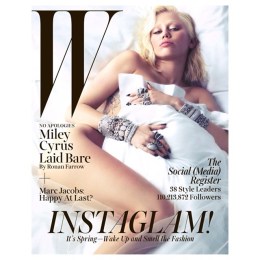
Miley Cyrus on the March cover of W Magazine
Miley, Miley, Miley. The controversial singer always knows how to snag some attention, and her latest interview — with Ronan Farrow for W — is no exception.
Hot off the heels of Cyrus’ MTV Unplugged special — where she performed country-style versions of her Bangerz songs — the songstress appears on the cover of the magazine’s March issue clad in just a bedsheet. (What were you expecting?) The cover image, along with the accompanying photo spread shot by Mert Alas and Marcus Piggott, is predictably provocative. The interview, however, offers up a few surprises.
Farrow, who will soon begin hosting a one-hour news show for MSNBC, flexes his interviewing skills during a several-hour chat with Cyrus in her Los Angeles home. Though Farrow admits that Cyrus isn’t the easiest interview subject — “[a] conversation with Cyrus plays more like a breakneck stream-of-consciousness soliloquy” than a discussion, he writes — he does manage to get some surprising details from the star, who discusses everything from her childhood to her causes to her controversies.
Here are the nine best things we learn about Cyrus in W:
- She’s not exactly keen on the demographic that made her a star: “I don’t love kids,” she tells Farrow. “I don’t love them because, I mean, I think I was around too many kids at one point—because I was around a lot of kids.” She goes on: “They’re so fucking mean. Sometimes I hear kids with their parents, and I want to go over and, like, smack them myself…Like if they meet me, they’ll be like, ‘Mom, don’t you know how to use an iPhone? Like, can you take the picture?’ I’m like, ‘Dude, if I ever talked to my mom like that when I was a kid, I would have had no phone, no computer, no TV, no anything.’ And so, yeah, kids are just mean.”
- She thinks her idyllic childhood growing up on a farm in Franklin, Tennessee, influenced her current performance style: “’We never were inside, and we never wore shoes,’ she recalls. ‘I think it’s why I like wearing no clothes so much and I’m always naked.'”
- She’s still looking for a way to put her fame to good use: Farrow writes, “Cyrus tells me she wants to have an impact on something. She runs through ideas in earnest. Animal welfare (‘Like, all my dogs have been rescued and are amazing’), bullying (‘I really want people not to be scared’), water purification (‘I think water’s, like, a really important thing’), the environment (‘I’m so scared the sky’s not going to be blue anymore. It’s going to be black from all the shit’).”
- She doesn’t relate to other pop princesses: “’I just don’t get what half the girls are wearing. Everyone to me seems like Vanna White. I’m trying to tell girls, like, ‘Fuck that. You don’t have to wear makeup. You don’t have to have long blonde hair and big titties. That’s not what it’s about. It’s, like, personal style.’ I like that I’m associated with sexuality and the kind of punk-rock shit where we just don’t care. Like Madonna or Blondie or Joan Jett.’”
- She doesn’t pay attention to the critics — or the criticism: When asked about the racial controversy that stemmed from her MVA performance, in which she used African-American back-up dancers, Cyrus tells Farrow, “I don’t give a shit. I’m not Disney, where they have, like, an Asian girl, a black girl, and a white girl, to be politically correct, and, like, everyone has bright-colored T-shirts. You know, it’s like, I’m not making any kind of statement. Anyone that hates on you is always below you, because they’re just jealous of what you have.”
- But she does save her best press: “’They did a write-up in Rolling Stone—like, the best albums of 2013,’ Cyrus says, taking a drag of her cigarette. ‘And my album was one of them! I printed it out. I give myself things to look at like that.’”
- For all her fans, she doesn’t have many friends: “’I have a lot of people that I could call and hang out with, but I have very few friends, if that makes any sense.’”
- Despite all the bells and whistles, Cyrus is still 100 percent devoted to the music: Farrow describes sharing a song he’d co-written with the pop star, noting, “Music is the one context in which I witness Cyrus listening exquisitely, deeply, wholly…. In a few minutes of music, she asks me more questions than she has in hours of conversation: about lyrics, melody, inspirations.”

